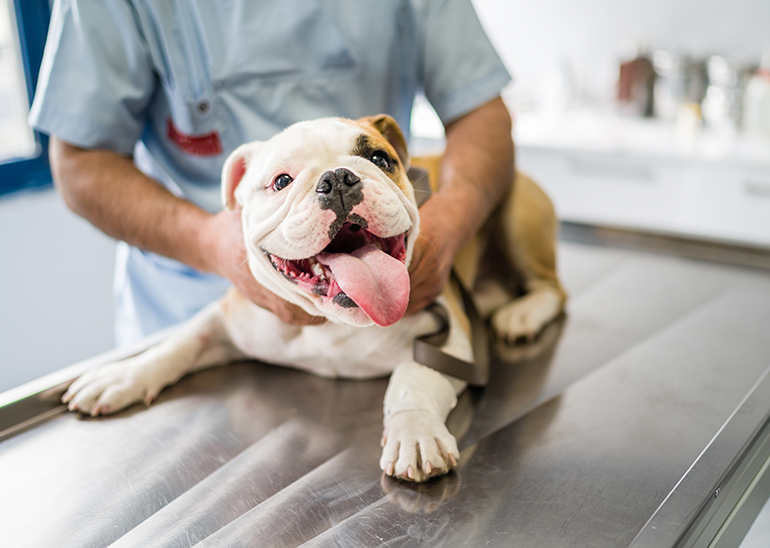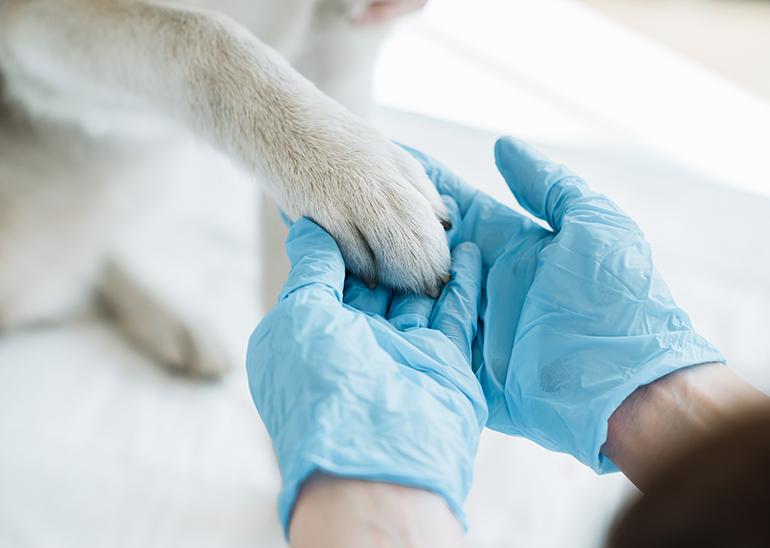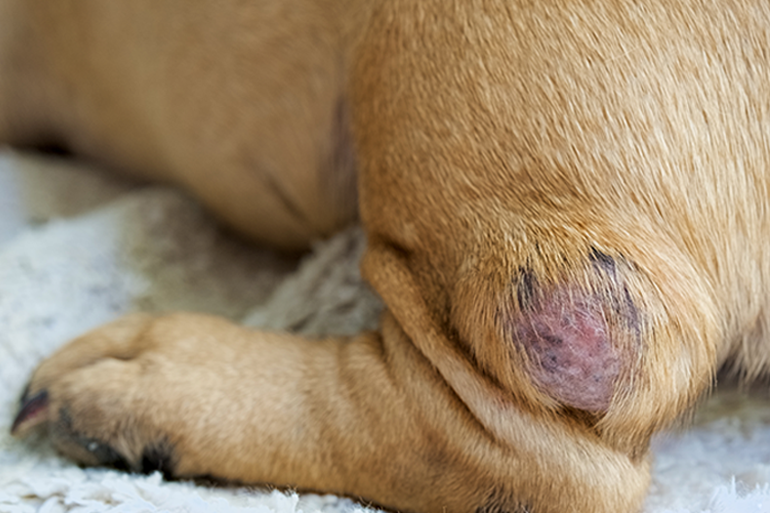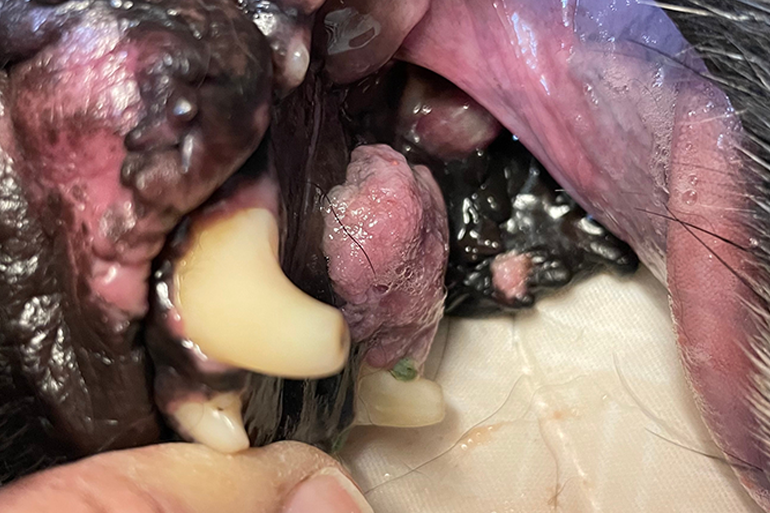Gilvetmab:
An innovative option
for treating cancer

Gilvetmab is the first and only immune checkpoint inhibitor developed for the treatment of mast cell tumors (MCTs) and melanomas in dogs.
Offer more hope even in metastatic and late-stage disease scenarios.
Want to stay informed about gilvetmab?
Receive additional product information and updates on availability.
What is gilvetmab?
Gilvetmab is a caninized monoclonal antibody used to treat dogs with MCTs and melanomas. It is an ideal systemic treatment option labeled for dogs with stage I, II, and III MCTs and stage II and III melanomas.
According to the Veterinary Cancer Society, an estimated 1 in 4 dogs
will develop cancer in their lives.1
How gilvetmab works to fight cancer

Gilvetmab is targeted to bind canine programmed cell death receptor-1 by interrupting the interaction between PD-L1/L2 and PD-1.2

Monoclonal antibodies stop cancer cells from suppressing T lymphocytesand turning off their protective immune response.

By preventing immune suppression, gilvetmab allows the dog’s immune system to destroy cancer cells.
Gilvetmab is administered intravenously over at least 30 minutes in the veterinary clinic.*
Learn more about dosing and administration of gilvetmab.
How gilvetmab works to fight cancer

73%
of dogs with MCTƗ
AND

60%
of dogs with melanomaǂ
had an objective response or stable disease
Quality of life without compromise in the majority of dogs treated

100%
of MCT patients
AND

92%
of melanoma patients
maintained good quality of life
based on pet owner assessment during treatment3,4

77.4% of veterinarians reported a quality of life performance score of 0 or 1, indicating excellent maintenance of quality of life.4,§

A field study demonstrated that gilvetmab is well tolerated in dogs with MCTs or melanomas5

Adverse reactions reported were generally transient and included mainly lethargy and inappetence/Gl upset¶
Unlike chemotherapy, no special handling is required to ensure the safety of veterinary staff or pet owners.
Gilvetmab will be distributed under a conditional license based on USDA requirements for demonstration of safety and reasonable expectation of efficacy. Additional studies are in progress to further support the safety and efficacy of gilvetmab. Production under this license is in compliance with all regulations and standards applicable to such products.

Locate an oncologist in
your area
Gilvetmab will initially be available only through specialists practicing veterinary oncology. To refer patients for treatment or confirm diagnosis, visit www.acvim.org or www.vetcancersociety.org to find a cancer specialist.

Ongoing clinical trials involving gilvetmab
If you would like to participate in or refer a patient to a clinical trial, view currently open studies here.

Gilvetmab Research Grant Program
For details about the gilvetmab grant program and how to apply.
MCTs and melanoma are among the most prevalent canine cancers

Mast Cell Tumors
Account for 16-21% of all skin tumors in dogs6
Standard of care is surgery, however not all cases are good candidates, and it isn’t always effective.
- Some locations, such as the limbs and head, may make it difficult to obtain clean margins
- The metastatic potential of MCTs is less than 10% in well-differentiated cases, 5% to 22% in moderately differentiated cases, and 55% to 95% in poorly differentiated cases7

Melanomas
Represent about 7% of all malignant canine tumors8
Standard of care is local control (surgery and radiation)
- Surgery (for tumors that are resectable)
- Dogs typically develop metastatic disease after surgery, and only 10% survive >1 year after surgery9
- Radiation (for non-resectable tumors)
- Not as effective
- High potential for metastasis
Combination therapy is the general standard of care for cancer in dogs.
Important factors to consider in patients:
- Age
- Breed
- Size of dog
- Sex (mammary)
- Site of tumor
- Tumor staging
* In studies, treatments were repeated every 2 weeks for up to 10 treatments, but additional treatments may be recommended based on response
Ɨ Objective response=46%
ǂ Objective response=20%.
§ 0=Uncompromised quality of life. 1=demonstrating clinical signs directly related to disease without compromised quality of life.
¶ Refer to product insert far more information.
For veterinary professionals.
INDICATION
This product contains gilvetmab, a caninized monoclonal antibody against canine programmed cell death receptor-1. For the treatment of dogs with mast cell tumors or melanomas. This product has demonstrated a reasonable expectation of efficacy and a preliminary safety profile in reducing the solid tumor burden in dogs with stage I, II, and III mast cell tumors or dogs with stage II and III melanomas. This product license is Conditional; safety, efficacy, and potency have not been fully evaluated. more information regarding safety, see productdata.aphis.usda.gov
References
- Is my dog at risk for cancer? American Animal Hospital Association. Accessed May 10, 2023. https://www.aaha.org/your-pet/pet-owner-education/ask-aaha/canine-cancer
- Yearley JH, Gibson C, Yu N, et al. PD-L2 expression in human tumors: Relevance to Anti-PD-1 therapy in cancer. Clin Cancer Res. 2017;23(12)3158-3167. doi:10.1158/1078-0432.CCR-16-1761
- Lynch S, Savary-Bataille K, Leeuw B, Argyle DJ. Development of a questionnaire assessing health related quality-of-life in dogs and cats with cancer. Vet Comp Oncol. 2011;9(3):172-82. Doi: 10.1111/j.1476-5829.2010.00244.x.
- Data on file. Merck Animal Health.
- Gilvetmab product insert. Madison NJ: Merck Animal Health; 2022.
- Pierini A, Lubas G, Gori E, et al. Epidemiology of breed-related mast cell tumour occurrence and prognostic significance of clinical features defined population of dogs in West- Central Italy. Vet Sci. 2019;6(2):53. doi:10.3390/vetsci6020053
- de Nardi AB, Dos Santos Horta R, Fonseca-Alves CE, et al. Diagnosis, prognosis and treatment of canine cutaneous and subcutaneous mast cell tumors. Cells. doi:10.3390/cells11040618
- Fonseca-Alves CE, Ferreira Ê, de Oliveira Massoco C, et al. Current status of canine melanoma diagnosis and therapy: Report from a colloquium on canine melanoma organized by ABROVET (Brazilian Association of Veterinary Oncology). Front Vet Sci. 2021;8:707025. doi:10.3389/fvets.2021.707025
- Melanoma—Location, location, location. Upstate Vet. Published November 26, 2018. Accessed May 22, 2023. https://upstatevet.com/2018/11/melanoma-location-location-location/
